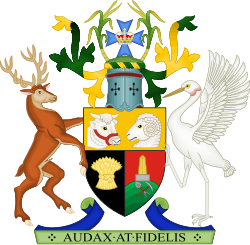Top Qs
Timeline
Chat
Perspective
Executive Council of Queensland
From Wikipedia, the free encyclopedia
Remove ads
The Executive Council of Queensland is the body through which the Premier and Ministers (collectively referred to as the Cabinet) advise the Governor of Queensland on the exercise of executive powers.
Composition
The Executive Council is composed of the Premier and other ministers (including the Deputy Premier and Attorney-General). The Governor chairs meetings, but is not a member. Assistant ministers (previously called parliamentary secretaries)[n 1] are not members.[2] New members are appointed to the Council upon joining Cabinet, and resign or have their appointments terminated upon leaving Cabinet. This is unlike the Federal Executive Council, where former ministers remain Executive Councillors, but only current ministers are invited to its meetings. Executive Council members are entitled to the style The Honourable while in office. Former Premiers who have served at least one year and former ministers who have served at least three may apply to use the style for life.[3]
Remove ads
Procedures
A quorum is two Executive Councillors plus the Governor (or an Executive Councillor presiding in his place).[4] Meetings are held on Thursdays at 11:45 a.m. in the Executive Council Room at Parliament House when the Legislative Assembly is sitting and the Cabinet Room at the Executive Building when it is not.[5] The Clerk of the Executive Council is also present at meetings. The Clerk formally presents each item of business ("minute") to the Governor, who approves them by initialing. After all the minutes have been approved, the meeting ends, the Councillors leave, and the Governor signs any Orders, commissions, or other documents as required.[6]
The formal term for the Governor acting on the advice of the Executive Council is the "Governor in Council".[7] Various statutes call for the Governor in Council to carry out its provisions. For example, the Constitution of Queensland Act 2001 provides for the Governor in Council to appoint judges to the Supreme Court.
Remove ads
Matters considered
Matters dealt with by the Governor in Council include the following:[8]
- Appointing, among others, judges, magistrates, justices of the peace, and senior members of the civil service
- Proclamations setting commencement dates for acts of Parliament
- Orders in Council relating activities and financing of local government
- Rearranging the machinery of Government
- Statutory instruments and other subordinate legislation
See also
Notes
- In establishing his ministry, Campbell Newman renamed them assistant ministers as he believed the term more easily understood.[1] The Constitution of Queensland Act 2001 and other statutes still use the name parliamentary secretaries.[2]
References
External links
Wikiwand - on
Seamless Wikipedia browsing. On steroids.
Remove ads

